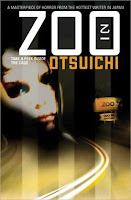 Author: Otsuichi
Author: Otsuichi
Translator: Terry Gallagher
U.S. publisher: Viz Media
ISBN: 9781421525877
Released: September 2009
Original release: 2006
Zoo is the second prose work by Otsuichi that I’ve read. It was published by Viz Media’s Japanese speculative fiction imprint Haikasoru in 2009 with a translation by Terry Gallagher, making it one of the earliest releases to come out of the division. Haikasoru was actually a little worried that Zoo wouldn’t do well; general horror doesn’t sell as much as many other genres in the United States. Happily, Zoo ended up becoming a finalist for the 2009 Shirley Jackson Award for a single-author collection. The short story collection was originally published in Japan in 2006, which makes it the most recent of Otsuichi’s works currently available in English. Even though another of his collections, Summer, Fireworks, and My Corpse (also published by Haikasoru) received a later English release than Zoo, the stories are from earlier in Otsuichi’s career. Having been impressed by his award-winning novel Goth, I was looking forward to reading Zoo.
Zoo collects eleven of Otsuichi’s horror short stories, beginning with the titular “Zoo.” There isn’t really an overarching theme to the stories, per se. In fact, there is a rather pleasant variety. “The White House in the Cold Forest” has a fairytale-like feel to it while “Song of the Sunny Spot” easily qualifies as science fiction. Some, like “In a Falling Airplane” and “Wardrobe” are firmly placed in the real world. “Find the Blood!” has a humorous, albeit dark, bent to it while there is nothing funny about “Words of God” at all. Familial relationships are often important in the stories collected in Zoo, but that is especially true for “Kazari and Yoko” and “SO-far.” Even the length of the stories vary. “In a Park at Twilight, a Long Time Ago” is just barely over two pages while the books finale, “Seven Rooms,” is the longest at thirty-nine.
While the eleven stories are very different, they share some similarities as well. All of the situations and settings that Otsuichi has created are bizarre and disconcerting. The stories are also all told from a first person perspective (except for arguably one) and the narrators aren’t always the most reliable. If the circumstances that the characters find themselves in are strange, they themselves are just as abnormal. It is frequently difficult to determine just where the border between fantasy and reality lies, or even if there is one. Another characteristic that the stories share, and I think this must be one of Otsuichi’s signatures, is that they all feature a twist of some sort in their plots. Sometimes there are even multiple twists. Even though I have come to expect this from Otsuichi’s work, the actual plot developments can still be surprising and quite effective.
The variety in the stories collected in Zoo is one of the book’s strongest points. Each story has a unique feel to it and each narrator has a distinct, individual voice. My compliments go to the translator for capturing this aspect of Otsuichi’s work so well. As with any short story collection, there will be a range in the quality of the individual works. The enjoyment of each story will also differ from reader to reader and will depend on personal taste to some extent. I, for one, didn’t particularly like “Find the Blood!” until I realized how funny it actually was. But once I did, I enjoyed the story very much. Overall, Zoo is a great, creepy collection. I’m not at all surprised that it received an award nomination. If I wasn’t a fan of Otsuichi already, I certainly am now. Currently, there are only two books by Otsuichi still in print in English, Zoo and Summer, Fireworks, and My Corpse. I hope to see more of Otsuichi’s works translated in the future.

Speak Your Mind